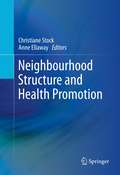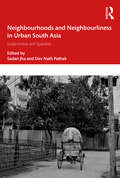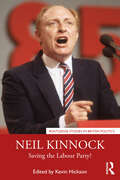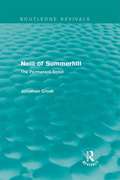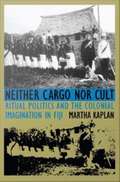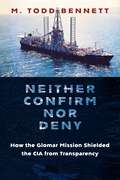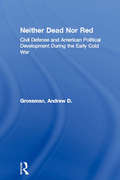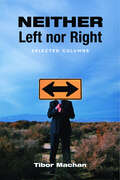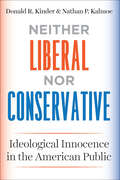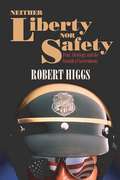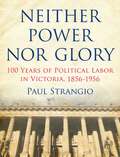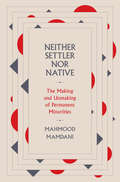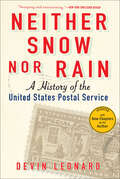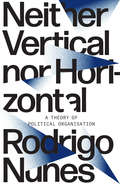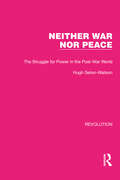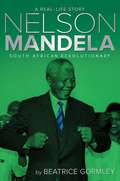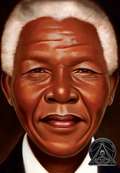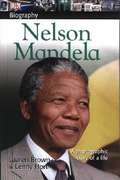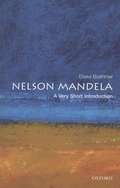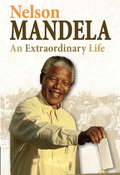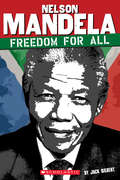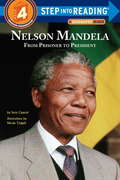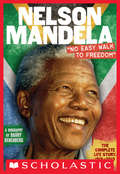- Table View
- List View
Neighbourhood Structure and Health Promotion
by Christiane Stock Anne EllawayIt has long been theorized that people living in poor areas have more health problems than their more advantaged peers. More recently, science has been testing this hypothesis, concentrating on the impact of the built environment on well-being and its contribution to health inequities. Neighbourhood Structure and Health Promotion offers sociology-based theory and evidence-based findings so readers may better understand the effects of place on health choices, behaviour, and outcomes. This international volume analyzes the complex relationships among neighbourhood conditions and characteristics, people's perceptions of where they live, and their everyday health lives, from eating habits and activity levels to smoking, drinking, and drug use. Chapters introduce innovative methods for measuring and monitoring links between place and health in terms of risks and resources, and employing objective and subjective data. Prospects for engaging neighbourhoods in prevention efforts, particularly involving young people, and policy implications for the future of health promotion and inequity reduction are discussed as well. Included in the coverage: The spatiality of injustice: area effects on behaviour.Qualitative and quantitative methods for assessing neighbourhood health resources.The potential of GIS and GPS in the health sciences.Green spaces and health: possibilities for research and policy.School neighbourhoods and obesity prevention in youth.Connecting gender, social environment, and health.Neighbourhood Structure and Health Promotion advances the study of this increasingly critical topic, making it a valuable reference for researchers, practitioners, policy makers and advanced students in health, health promotion, social epidemiology, and urban planning.
Neighbourhoods and Neighbourliness in Urban South Asia: Subjectivities and Spatiality
by Sadan Jha and Dev Nath PathakThis volume examines urban South Asia through the ideas of neighbourhood and neighbourliness. With a focus on the affective socio-spatial and sensorial experiences of non-metropolitan, small and intermediate cities, the chapters in the volume look at neighbourhoods as a key to exploring the textures of urban life. Bringing together scholars from a variety of disciplines including sociology, anthropology, urban studies, planning, and social history, the book highlights urban heterogeneity and contemporary transformations in South Asia. It discusses the linkages between urban lived spaces and social life; memory, migration, and exile; and the city and its society through practices of everyday life in neighbourhoods. With studies from Sri Lanka, Nepal, Afghanistan, Bangladesh, and India, the volume addresses a wide range of issues pertaining to urban experiences in their regional specificities and in a broader context of the Global South. This book will be useful to scholars and researchers of urban sociology, anthropology, urban studies, planning and development, social history, political studies, cultural studies, geography, and South Asian studies. It will also interest practitioners and policymakers, architects, planners, civil society organisations, and thinktanks.
Neil Kinnock: Saving the Labour Party?
by Kevin HicksonThe book reappraises Neil Kinnock’s policies, impact, legacy and leadership of the Labour Party 30 years on from his defeat in the 1992 general election. It offers comprehensively fresh perspectives and some first-hand accounts – some friendly, others more critical – from leading academics, journalists, politicians and advisors on various aspects of ideas, policy, elections and party management, including an interview with the man himself as he looks back on his experiences. This timely book will resonate widely with the current challenges to Labour’s leadership and the enduring uncertainties on the future of the party.This book will be of key interest to researchers and students in the fields of political studies and contemporary history as well as the interested general reader.
Neill of Summerhill: The Permanent Rebel (Routledge Revivals)
by Jonathan CroallA. S. Neill was arguably the most famous child educator of the twentieth century. He was certainly the most controversial. All over the world, countless parents and teachers have been shocked, delighted or inspired by his subversive ideas about education, or by a visit to ‘that dreadful school’ which continues to this day – Summerhill. First published in 1983, this sympathetic but critical exploration of his iconoclastic ideas and personality is the result of interviews with two hundred ex-pupils, parents and teachers about life at Summerhill, and of the practicality of Neill’s philosophy about child freedom. Jonathan Croall has also drawn on many unpublished letters and documents, which help to illuminate Neill’s personal struggles, and his analysis and friendship with Homer Lane, Wilhelm Stekel and Wilhelm Reich. The result is a fascinating and revealing portrait of a remarkable man who, in his absolute determination to be ‘on the side of the child’, remained in permanent opposition to the adult world.
Neither Cargo Nor Cult
by Martha KaplanIn the 1880s an oracle priest, Navosavakadua, mobilized Fijians of the hinterlands against the encroachment of both Fijian chiefs and British colonizers. British officials called the movement the Tuka cult, imagining it as a contagious superstition that had to be stopped. Navosavakadua and many of his followers, deemed "dangerous and disaffected natives," were exiled. Scholars have since made Tuka the standard example of the Pacific cargo cult, describing it as a millenarian movement in which dispossessed islanders sought Western goods by magical means. In this study of colonial and postcolonial Fiji, Martha Kaplan examines the effects of narratives made real and traces a complex history that began neither as a search for cargo, nor as a cult. Engaging Fijian oral history and texts as well as colonial records, Kaplan resituates Tuka in the flow of indigenous Fijian history-making and rereads the archives for an ethnography of British colonizing power. Proposing neither unchanging indigenous culture nor the inevitable hegemony of colonial power, she describes the dialogic relationship between plural, contesting, and changing articulations of both Fijian and colonial culture. A remarkable enthnographic account of power and meaning, Neither Cargo nor Cult addresses compelling questions within anthropological theory. It will attract a wide audience among those interested in colonial and postcolonial societies, ritual and religious movements, hegemony and resistance, and the Pacific Islands.
Neither Confirm nor Deny: How the Glomar Mission Shielded the CIA from Transparency (Global America)
by Professor Todd BennettIn 1974, the Hughes Glomar Explorer, ostensibly an advanced deep-sea mining vessel owned by reclusive billionaire Howard Hughes, lowered a claw-like contraption to the floor of the Pacific Ocean. This high-tech venture was only a cover story for an even more improbable scheme: a CIA mission to retrieve a sunken Soviet submarine. Like a Jules Verne novel with an Ian Fleming twist, the saga of the Glomar Explorer features underwater espionage, impossible gadgetry, and high-stakes international drama. It also marks a key moment in the history of transparency—and not just for what became known as the Glomar response: “We can neither confirm nor deny. . . . ”M. Todd Bennett plumbs the depths of government secrecy in this new account of the Glomar mission and its consequences. Trawling through recently declassified documents, he explores the logistics, media fallout, and geopolitical significance of one of the most ambitious operations in intelligence history. Glomar, Bennett argues, played a pivotal but underappreciated role in helping the CIA ward off oversight amid a push for transparency and accountability. He reframes the operation’s history to offer an alternative perspective on the 1970s, a decade known for expansive openness, as well as the persistent tension between the demands of democracy and the need for secrecy in foreign policy. Combining keen historical analysis and gripping storytelling, Neither Confirm nor Deny brings to the surface fresh insights into the history of the security state, the politics of intelligence, and the CIA’s relationship with the media and the public.
Neither Dead Nor Red: Civil Defense and American Political Development During the Early Cold War
by Andrew D. GrossmanFirst Published in 2001. Routledge is an imprint of Taylor & Francis, an informa company.
Neither Left nor Right: Selected Columns
by Tibor R. MachanIn Neither Left nor Right, a collection of his columns, Machan, a relentless advocate of the political philosophy of libertarianism, offers his always well-reasoned, often controversial opinions on the variety of threats to individual liberty in the United States and around the world.
Neither Liberal nor Conservative: Ideological Innocence in the American Public (Chicago Studies in American Politics)
by Donald R. Kinder Nathan P. KalmoeCongress is crippled by ideological conflict. The political parties are more polarized today than at any time since the Civil War. Americans disagree, fiercely, about just about everything, from terrorism and national security, to taxes and government spending, to immigration and gay marriage. Well, American elites disagree fiercely. But average Americans do not. This, at least, was the position staked out by Philip Converse in his famous essay on belief systems, which drew on surveys carried out during the Eisenhower Era to conclude that most Americans were innocent of ideology. In Neither Liberal nor Conservative, Donald Kinder and Nathan Kalmoe argue that ideological innocence applies nearly as well to the current state of American public opinion. Real liberals and real conservatives are found in impressive numbers only among those who are deeply engaged in political life. The ideological battles between American political elites show up as scattered skirmishes in the general public, if they show up at all. If ideology is out of reach for all but a few who are deeply and seriously engaged in political life, how do Americans decide whom to elect president; whether affirmative action is good or bad? Kinder and Kalmoe offer a persuasive group-centered answer. Political preferences arise less from ideological differences than from the attachments and antagonisms of group life.
Neither Liberty nor Safety: Fear, Ideology, and the Growth of Government
by Robert Higgs"Those who would give up essential Liberty, to purchase a little temporary Safety, deserve neither Liberty nor Safety," wrote Benjamin Franklin. Attempting to gain security by sacrificing liberty is also a foolish action because it only increases the potential for harm.In Neither Liberty Nor Safety: Fear, Ideology, and the Growth of Government, economist and historian Robert Higgs illustrates the false trade-off between freedom and security by showing how the U.S. government&’s economic and military interventions reduced the civil and economic liberties, prosperity, and genuine security of Americans in the 20th century. Extending the theme of Higgs&’s earlier books, Neither Liberty Nor Safety stresses the role of misguided ideas in the expansion of government power at the expense of individual liberty. Higgs illuminates not only many underappreciated aspects of the Great Depression, the two world wars, and the postwar era, but also the government&’s manipulation of public opinion and the role that ideologies play in influencing political outcomes and economic performance.
Neither Peace nor Freedom: The Cultural Cold War in Latin America
by Patrick IberPatrick Iber tells the story of left-wing Latin American artists, writers, and scholars who worked as diplomats, advised rulers, opposed dictators, and even led nations during the Cold War. Ultimately, they could not break free from the era's rigid binaries, and found little room to promote their social democratic ideals without compromising them.
Neither Power Nor Glory: 100 Years Of Political Labor In Victoria, 1856-1956
by Paul StrangioWhen Frank Hardy published Power Without Glory, his notorious novel about corruption and venality in the Victorian Labor Party, it quickly came to be seen as a true account of the party. Until now, there has been no authoritative chronicle of the struggles of political Labor in Victoria, from its origins in the mid-nineteenth century through to the calamitous split of the 1950s. By conventional measures these were fallow years. Ensnared by the colony's powerful liberal protectionist tradition in the late nineteenth century, Victorian Labor then found itself hindered by a grossly unfair electoral system and the lack of a constituency outside Melbourne's industrial suburbs. But exile from government also meant that the party developed its own distinctive traditions and culture. It was a unique and intriguing species among the state Labor parties. Meticulously researched and elegantly written, Neither Power Nor Glory fills an important gap in Australian political history and our understanding of the Labor Party. It is also a timely antidote to nostalgia about Labor's past. In Victoria at least, that past was anything but golden. WINNER OF THE 2013 HENRY MAYER PRIZE
Neither Settler nor Native: The Making And Unmaking Of Permanent Minorities
by Mahmood MamdaniMaking the radical argument that the nation-state was born of colonialism, this book calls us to rethink political violence and reimagine political community beyond majorities and minorities.In this genealogy of political modernity, Mahmood Mamdani argues that the nation-state and the colonial state created each other. In case after case around the globe—from the New World to South Africa, Israel to Germany to Sudan—the colonial state and the nation-state have been mutually constructed through the politicization of a religious or ethnic majority at the expense of an equally manufactured minority.The model emerged in North America, where genocide and internment on reservations created both a permanent native underclass and the physical and ideological spaces in which new immigrant identities crystallized as a settler nation. In Europe, this template would be used by the Nazis to address the Jewish Question, and after the fall of the Third Reich, by the Allies to redraw the boundaries of Eastern Europe’s nation-states, cleansing them of their minorities. After Nuremberg the template was used to preserve the idea of the Jews as a separate nation. By establishing Israel through the minoritization of Palestinian Arabs, Zionist settlers followed the North American example. The result has been another cycle of violence.Neither Settler nor Native offers a vision for arresting this historical process. Mamdani rejects the “criminal” solution attempted at Nuremberg, which held individual perpetrators responsible without questioning Nazism as a political project and thus the violence of the nation-state itself. Instead, political violence demands political solutions: not criminal justice for perpetrators but a rethinking of the political community for all survivors—victims, perpetrators, bystanders, beneficiaries—based on common residence and the commitment to build a common future without the permanent political identities of settler and native. Mamdani points to the anti-apartheid struggle in South Africa as an unfinished project, seeking a state without a nation.
Neither Snow Nor Rain: A History of the United States Postal Service
by Devin Leonard&“[The] book makes you care what happens to its main protagonist, the U.S. Postal Service itself. And, as such, it leaves you at the end in suspense.&” —USA Today Founded by Benjamin Franklin, the United States Postal Service was the information network that bound far-flung Americans together, and yet, it is slowly vanishing. Critics say it is slow and archaic. Mail volume is down. The workforce is shrinking. Post offices are closing. In Neither Snow Nor Rain, journalist Devin Leonard tackles the fascinating, centuries-long history of the USPS, from the first letter carriers through Franklin&’s days, when postmasters worked out of their homes and post roads cut new paths through the wilderness. Under Andrew Jackson, the post office was molded into a vast patronage machine, and by the 1870s, over seventy percent of federal employees were postal workers. As the country boomed, USPS aggressively developed new technology, from mobile post offices on railroads and airmail service to mechanical sorting machines and optical character readers. Neither Snow Nor Rain is a rich, multifaceted history, full of remarkable characters, from the stamp-collecting FDR, to the revolutionaries who challenged USPS&’s monopoly on mail, to the renegade union members who brought the system—and the country—to a halt in the 1970s. &“Delectably readable . . . Leonard&’s account offers surprises on almost every other page . . . [and] delivers both the triumphs and travails with clarity, wit and heart.&” —Chicago Tribune
Neither Vertical Nor Horizontal: A Theory of Political Organization
by Rodrigo NunesHow do we organize in a world after both Occupy and the Sanders campaign?A decade ago, a wave of mass mobilisations described as "horizontal" and "leaderless" swept the planet, holding the promise of real democracy and justice for the 99%. Many saw its subsequent ebb as proof of the need to go back to what was once called "the question of organisation". For something so often described as essential, however, political organisation remains a surprisingly under-theorised field. In this book, Rodrigo Nunes proposes to remedy that lack by starting again from scratch. Redefining the terms of the problem, he rejects the confusion between organisation and any of the forms it can take, such as the party, and argues that organisation must be understood as always supposing a diverse ecology of different initiatives and organisational forms. Drawing from a wide array of sources and traditions that include cybernetics, poststructuralism, network theory and Marxism, Nunes develops a grammar that eschews easy oppositions between "verticalism" and "horizontalism", centralisation and dispersion, and offers a fresh approach to enduring issues like spontaneity, leadership, democracy, strategy, populism, revolution, and the relationship between movements and parties.
Neither War Nor Peace: The Struggle for Power in the Post-War World (Routledge Library Editions: Revolution #18)
by Hugh Seton-WatsonThis book, first published in 1960, is an analysis of the turbulent and revolutionary world politics of the 15 years following the Second World War. It examines the main themes of revolutionary forces, totalitarianism and imperialism, including, in detail, the social questions that lie behind them.
Neither War Nor Peace: The Struggle for Power in the Postwar World
by Hugh Seton-WatsonExploring the rivalry between the United States and the Soviet Union.
Nelson Mandela
by Beatrice GormleyGet a behind-the-scenes glimpse of what it takes to change the world in this comprehensive biography that tells the complete life story of internationally renowned peacemaker Nelson Mandela.Civil rights activist. World leader. Writer. Throughout his life, Nelson Mandela took on many roles, all in the pursuit of peace. Born in 1918 in South Africa, he grew up in a culture of government-enforced racism and became involved in the anti-apartheid movement at a young age. Deeply committed to nonviolent activism, Mandela directed a peaceful campaign against the racist policies of his South African government, and spent twenty-seven years in prison as a result. In the years following his emergence as a free man, he continued his efforts to dismantle the country's apartheid system and was awarded the Nobel Peace Prize alongside South African President F.W. de Klerk. In 1994 he was inaugurated as South Africa's first black president and served until his retirement from active politics in 1999 at the age of eighty-one. He continued to promote global peace until his death in 2013, and his legacy lives on. From Nelson Mandela's childhood to his monumental impact on race relations and nonviolent activism, this comprehensive biography shares the truth about the man behind the iconic smile: his struggles, his triumphs, and the sacrifices along the way.
Nelson Mandela
by Kadir NelsonThis stunning picture book biography of Nelson Mandela by Kadir Nelson is a receipient of the Coretta Scott King Honor award. In this picture book biography, award-winning author and illustrator Kadir Nelson tells the story of Mandela, a global icon, in poignant free verse and glorious illustrations. It is the story of a young boy's determination to change South Africa, and of the struggles of a man who eventually became the president of his country by believing in equality for all people, no matter the color of their skin. Readers will be inspired by Mandela's triumph and his lifelong quest to create a more just world. An author's note at the back retells the story of Mandela's fight against apartheid in simple prose, and takes the story further, including Mandela's Nobel Peace Prize. A short bibliography lists additional sources for readers who want to find out more.
Nelson Mandela
by Lenny Hort Laaren BrownSouth African human rights activist Nelson Mandela is the focus of this biography, which explains to young readers in age-appropriate language Mandela's place in world history.
Nelson Mandela: A Very Short Introduction
by Tom Lodge Elleke BoehmerNelson Mandela--is it possible to say who or what he is? Yes, he was one of the world's longest-detained political prisoners. He is a universal symbol of social justice certainly; an exemplary figure connoting non-racialism and democracy; a moral giant. For years a man cut off from the world, Mandela became after his 1994 release an internationally recognizable icon. But why should his story be important to us in the world at large today? What do his achievements signify not only nationally in South Africa but also internationally? This book is about the different, interconnected stories, histories, values and symbols that Nelson Mandela embodies. Across his life Mandela has filled a rich range of roles: handsome city-slicker, dashing guerrilla, the millennial savior figure. By examining these different roles as well as the principles which lie behind and motivate them, this Very Short Introduction presents an analytical portrait of a shape-shifting life. Set within a biographical frame, the book offers a more deeply personal analysis of Mandela than biographies centered on the towering public figure have been able provide.
Nelson Mandela: An Extraordinary Life (Twentieth Century History Makers)
by Ann KramerTwentieth Century History Makers: Nelson Mandela offers a fascinating and complete look at one of the 20th century's great leaders and humanitarians. Beginning with his early life in a rural part of South Africa, the book traces the course of Mandela's life - his legal studies, helping to found the ANC, freedom fighting, trial for treason and harsh imprisonment. The story continues with Mandela's release from prison, the incredible story of the defeat of apartheid and his election as president, retirement, humanitarian activities and his death and funeral in 2013.
Nelson Mandela: Freedom For All
by Jack SilbertIn South Africa, Nelson Mandela is known as "the father of the nation," and around the world he is revered for his political and humanitarian accomplishments. Nelson Mandela: Freedom For All covers all of the most important parts of this incredible man's life: his 26 years as a political prisoner; his receipt of the Nobel Peace Prize in 1993 for his work against apartheid; his election as the first black president of South Africa in 1994; and more! Until he left office in 1999, Mandela helped to dismantle apartheid and create a new constitution for the country. Mandela remained politically active even after his retirement. He championed humanitarian issues like fighting HIV and AIDS under the Nelson Mandela Foundation. Nelson Mandela: Freedom For All is the most up-to-date account of Mandela's inspiring life story.
Nelson Mandela: From Prisoner to President
by Suzy Capozzi Nicole TadgellThis Step 4 leveled reader about Nelson Mandela, the Nobel Prize-winning activist for racial equality in South Africa, is as spellbinding a biography as you can find. His journey from student to revolutionary to inmate to president of South Africa will inspire and engage kids of all ages. As conversations about race, prejudice, and injustice pervade classrooms and homes, teachers and parents need books that can bring those discussions within the grasp of kids. Nelson Mandela's story, told honestly and accessibly, is just such a book. The subjects of apartheid and racism are handled with aplomb, and readers will find much to discuss with their classmates, friends, and families. Step 4 Readers use challenging vocabulary and short paragraphs to tell exciting stories. For newly independent readers who read simple sentences with confidence.From the Trade Paperback edition.
Nelson Mandela: No Easy Walk to Freedom
by Barry DenenbergFrom his humble beginnings in rural South Africa to his tragic death at age 95 in 2013, Nelson Mandela's life is a tale of inspiration and courage. The most up-to-date biography of Nelson Mandela.This powerful biography provides an in-depth look at Nelson Mandela who grew up in a rural village in South Africa under racist apartheid rule--a regime heultimately helped overthrow.Denenberg explores the history of South Africa and its often violent struggle for civil rights, while tracing Mandela's role in that history. Lawyer, leader of the African National Congress, political prisoner who spent 26 years in jail, president--no one else has had such enormous influence on his fellow South Africans. Even beyond South Africa Nelson Mandela influenced freedom fighters everywhere.This latest biography traces Mandela's complete life story
